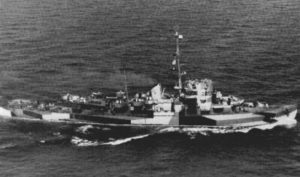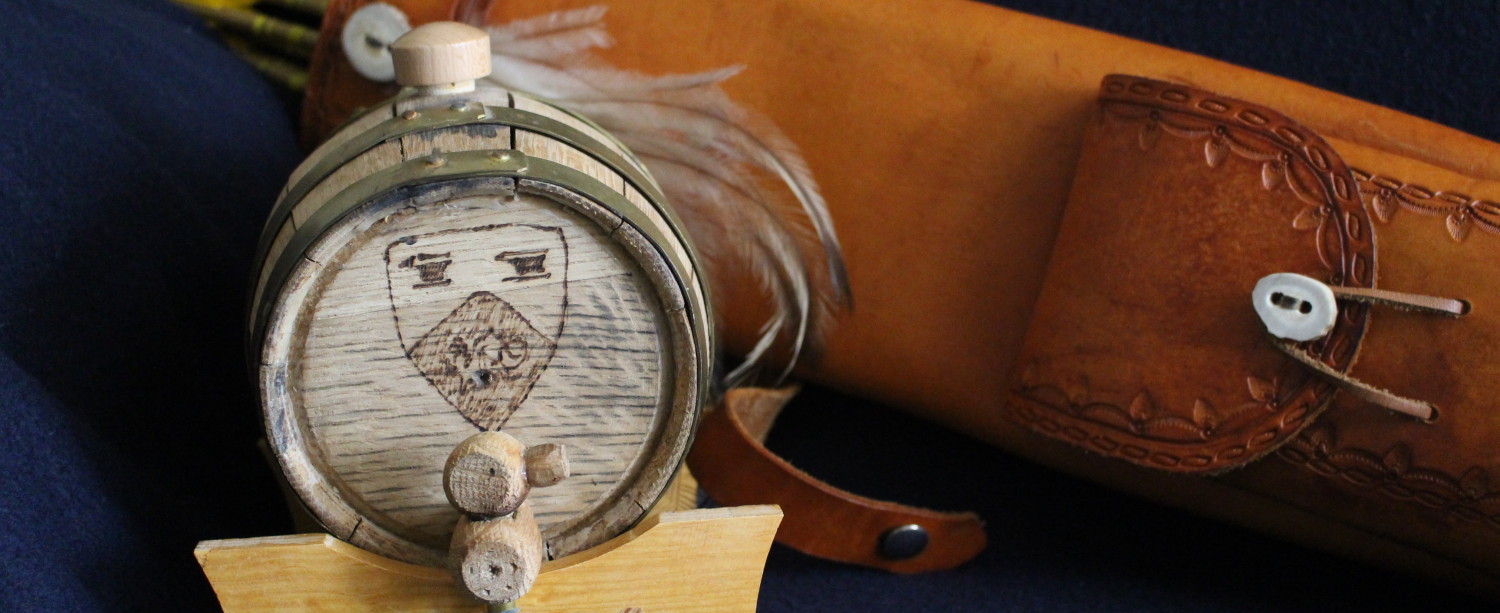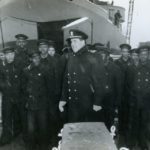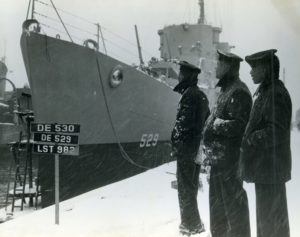Mid-Watch in Verse: USS Mason (DE-529)
This post is a continuation of the Mid-Watch in Verse series. Past posts focused on deck logs from the USS Maryland and USS Huse. Given that this month is Black History Month, I decided to honor an almost unique ship in the US Navy during WWII: The USS Mason (DE-529). The deck log verse highlighted in this post was written by, then Lieutenant (jg) William W. Kitts. Lt Kitts was white, as were all the officers and chiefs of the Mason when she was commissioned. The rest of the crew were Black.
Midwatch in Verse is now available as a book that features poems from 29 ships during WWII. See the book’s website for details.
 The Mason was the only sea-worthy vessel in the Navy with this distinction. The USS PC-1264 also maintained a Black enlisted-men crew, but she was a coastal patrol vessel while the Mason made numerous Atlantic Ocean crossings guarding convoys and hunting U-boats, although I do not minimize the service of PC-1264 as she shuttled convoys north and south off the coast of the U.S.
The Mason was the only sea-worthy vessel in the Navy with this distinction. The USS PC-1264 also maintained a Black enlisted-men crew, but she was a coastal patrol vessel while the Mason made numerous Atlantic Ocean crossings guarding convoys and hunting U-boats, although I do not minimize the service of PC-1264 as she shuttled convoys north and south off the coast of the U.S.
The Mason was an experiment testing whether African Americans could hold positions in the Navy other than stewards and mess men. Some accounts referred to the Mason as “Eleanor’s Folly” because of First Lady Eleanor Roosevelt’s opposition to segregation. I will not recount the history of the Mason. Her history is nicely outlined in two books: Mary Pat Kelly’s “Proudly We Served: The Men of the USS Mason” and “Onboard the USS Mason: The WWII Diary of James A. Dunn” by Butler, Blackford, and Dunn. I will add just a few comments for context.
Willliam M. Blackford, the great grandson of an abolitionist, captained the Mason upon her commission. He often said that he wasn’t there to make a statement about race, but to run the best ship in the Navy. The enlisted men referred to Blackford as “Big Bill,” but not to his face. He was universally loved by the crew who often said that they would follow him to hell and back. Apparently, Blackford demonstrated right from the start that he was not going to put up with crewmen who shirked their duties. Take a look at the 0800-1200 entry on this deck log recorded four days after commissioning!
The officers, all white, were given the choice about whether to serve on the Mason or not. According to William Farrell (Engineering Officer), the officers decided that they would discuss whether to serve and that the vote would have to be an all “no” or all “yes.” They were a little concerned about William W. Kitts, the writer of the poem highlighted in this post, because he was from Texas and might object to serving with the Black crew. He did not and the officers of the Mason were set.
One of the more harrowing experiences of the Mason‘s crew involved their escort of Convoy NY.119 in September and October of 1944. The Mason experienced some of the worst that the North Atlantic could dish out weather-wise. High wind and seas led to sinking of some convoy vessels and barges that were being towed. By the time the convoy arrived off the coast of England, it was scattered over a wide area. The Mason crew navigated from buoy to buoy to find their way to port. After delivering the first set of convoy vessels, she returned to gather up stragglers to lead them to port. All of this occurred even though the Mason had developed a huge crack in her deck and the crew had to take a couple of hours during this shuttle service to weld the crack shut. The Mason was to have received a Letter of Commendation, but it never came. Discrimination struck again. It wasn’t until 1995 that President Bill Clinton issued the Commendation for the heroic role the Mason played in the escort of NY.119.
The crew of the Mason experienced considerable discrimination while in ports in the U.S. However, one of the most poignant accounts of the Mason crew experience in port came when they arrived in Northern Ireland in July of 1944. Mason‘s crew found the people of Northern Ireland to be most friendly and welcoming. Lorenzo DuFau gave the following account from Kelly’s book:
Never in my life had we received such greetings from people, perfect strangers. It’s hard to find words to describe the Belfast experience, what we felt to be received the way we were by the people. We actually had a lady apologize for the weather conditions. She was wishing it was a sunshiny day, because it was so beautiful there, and she wanted us to see it so beautiful. She was sorry it was overcast…..
We had to travel from our own home country, our own home town, over all this water, to get to a place where people treated us like human beings.
Now to the mid-watch verse.
Here is what Lt(jg). William W. Kitts entered into the deck log on January 1, 1945. Note that near the end of the poem, Kitts acknowledges that some of the verse was actually composed by the quartermaster. History tells us that some of the poems entered in deck logs were actually written by other members of the crew or groups of crewman, not necessarily the OOD (Officer Of the Deck) of record. The Mason had several crewman with the quartermaster rating (shown in this photo), so we will likely never know whose words Kitts was posting in this poem.
00 – 04
Here in the beginning while it’s so near
I wish you all a Happy New Year!
Underway from Norfolk, the state of Virginny,
In the U.S.A., the land of plenty.
We’re bound for a place called Oran, Algiers,
Of the Frenchmen there, we have not fears.
The “Boss” of this “gang”, Task Force Sixty-Four,
Is riding the BALCH, and he knows the score.
This “Gang” is made up, if you’re interested, matey,
Of DesDiv two-six and CortDiv Eighty.
Of course the Coast Guard must be along,
They sent the GULFPORT to sing their song.
The “Gang” is excorting merships by the score
It’s known as convoy UGS Sixty-Four.
Zero plus nine five is base course, that’s true,
As onward we sail o’er the ocean so blue.
The speed we are making keeps us lookin’ alive,
Given in knots, it is nine point five.
With fifteen knots as standard speed set,
We’re making two-thirds, but we’re not there yet.
In order to stay on station right,
Three one five turns we’re doing tonight.
Two main engines are runnin’ == hear ‘em Sport?
Number two on the starboard, number four on the port.
In position three is where we stand,
Thus able to screen on the starboard hand.
“In Disposition Baker” our Command cried,
“On plan Two Able I did decide.”
“In case you’re interested in who made same”
“You’re talking to the one who’s to blame.”
As the old year has departed, and the New Year has begun,
On the war cruising watch stood section one.
The quartermaster on watch is a poet of rare wit,
And here I copy just as he “writ”:
2356 – : “Four one five” came to the wheel,
For back into position we must steal
0008 – : Now the turns are three twenty, and there they will stay,
Unless Lieutenant KITTS has more to say.
0014 – : The Captain called, ‘cause he couldn’t be near
To wish the O.O.D.’s a “Happy New Year.”
0345 – : When this watch was over together we cried,
“Tho we didn’t par Whitman, My! How we tried
W. W. Kitts
I must also add an additional verse that Lt. Kitts submitted for the 1600 to 1800 watch. This is, in my experience, unprecedented. I’ve read literally hundreds of deck logs and I’ve not seen anyone violate the “rule” that verse is only appropriate for the January 1, 0000 – 0400 watch, making the Mason a very special vessel once again!
16 – 18 – Round and round the clock hands go,
The hours pass, but very slow.
I won’t say much, tho I could say more,
For this short watch, just – steaming as before.
One other thing I’d better add,
In case it interests some other lad,
At seventeen ten by the wheel house clock,
To three twenty five the turns we did rock.
W. W. Kitts
The actual deck logs quoted above can be found here and here.
So, who is Lt. W. W. Kitts?
William Wayne Kitts was born in 1921 in Sulpher Springs, TX. He was the valedictorian of his high school class in 1938 before attending the University of Texas. He graduated with a physics major in 1942 and enlisted in the Navy. He came aboard the Mason as an ensign. Over time, he rose up the ranks in the US Navy Reserve and was recalled to service during the Korean war. He eventually rose to the rank of Captain before retiring from the Naval Reserve.
Over the years, he earned a couple of Masters degrees and had a distinguished career in the aerospace industry, leading the team that designed the Lockheed/LTV S3-A aircraft. He was a 32nd degree Mason. Kitts was active in his local Southern Baptist congregation and died at the age of 96 on January 31, 2018.
Kitts’ cooperation with the “experiment” to integrate the U.S. Navy cannot be minimized. In a day when Blacks were treated so poorly by many in the U.S. population, Kitts seemed to accept them as equals to the task of defeating the enemies of the U.S.



Very interesting. It reminds me of a famous surgeon who wrote THE medical book on the diagnosing the acute abdomen. When he developed an acute abdomen himself and was sidelined for 6 weeks recovering, he rewrote his book in verse!! Somehow I have misplaced the book, but now I’m motivated to find it again. George
Really enjoyed this entry, Dave. Nice job with the background on the ship.
(A minor correction: In the first sentence of Kits’ bio you repeat the phrase “in 1921.”) 🙂
And I, of course, misspelled Kitt’s name. 🙂
Thanks! I missed that. Didn’t have my editor read this before posting!